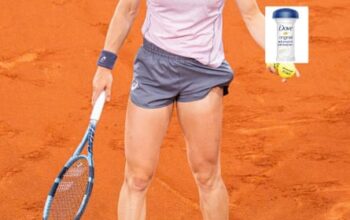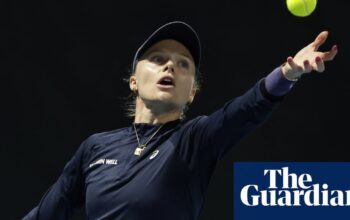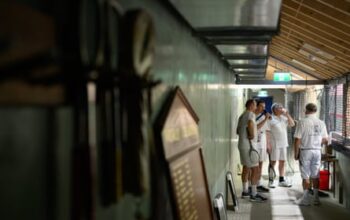Deep inside the Vienna Ice Skating Club, an enormous ice rink temporarily adapted into indoor tennis courts in October, Jack Draper was hard at work before one of his final tournaments of the season. His sparring partner for the day was Frances Tiafoe, a fellow top-20 player well known for his humour even in the searing heat of battle. As they toiled through practice sets, the American kept on reacting to their spectacular winners by glancing down the court, each time trying to catch his opponent’s eye so that he could crack another joke.
Draper, however, had other priorities. The British No 1 was completely locked in, focused only on extracting the best out of himself in their limited time on court. He played some brutal, attacking tennis in the process and after an hour of great intensity, their practice ended with Draper leading by a set.
Throughout this year Draper has continually noted that his breakthrough performances are a consequence of the consistent daily work and professionalism he has recently embraced. In that silent Viennese hall, with no one else watching, his focus was undeniable.
“When I was younger, I didn’t really have much of a working mentality,” says Draper, who turns 23 on 22 December. “When you’re young, you step into the world of tennis and you don’t really know what it’s all about.
“It’s a brutal change, because you realise that if you want to be good, you have to mature and be an adult when you’re 20 years old. I wasn’t quite ready for that; I didn’t want to put in hard work. I didn’t want to sacrifice. I didn’t want to be professional. I didn’t want to do all the things it takes.”
It was not until Draper missed the grass season last year, including Wimbledon, with a shoulder injury that this mentality shifted. Until then his countless injuries and physical problems had essentially defined his career.
“That’s when the penny dropped that I really needed to change,” he says. “I’m very, very proud of the way I took it upon myself to really be different and I’ve got a lot of rewards from those decisions. A lot of good things have come from just trying to really take it upon myself to be better and grow, be a better person, be more independent and just more of a man.”
By the end of the week in Austria, Draper’s efforts had yielded another significant reward as he earned the biggest title of his career at the Vienna Open, his first ATP 500 success. It was the perfect way to punctuate a year when he has established himself as the new leader of British men’s tennis. He finished 2024 with his first two ATP titles, his first grand slam semi-final, at the US Open in September, and a career-high ranking of 14.
Things were not always smooth this year. Halfway through the season, every other match he played seemed to end in brutal three-set losses. Still, Draper handled his disappointments and doubts with maturity, always hopeful that he remained on the right path. “I think it was good for me,” he says.

“I hear people say all the time that it’s not the achievement that feels great, it’s the process of the achievement. Going through all that; all the work, the doubts, the worries and the kind of like: ‘Am I going to do this? Am I going to that?’ It’s the actual work that you put in which is the enjoyable part.
“Looking back over this year, I’ve had some amazing moments that made me feel good, but I’ve also learned to enjoy all the hard work and all the tough things that go with it.”
Maturity has been a common theme in a year when he has also gained greater independence away from the court. A couple of years ago, the kitchen in his family home was such uncharted territory that he decided to ask his good friend Jannik Sinner for advice.
“I didn’t know how to cook anything,” he says, laughing. “He’s Italian, so I thought he’d know how to make pasta. I should have just asked my mum, but I didn’t. He did a good pasta and taught me how to do it.”
In recent months, though, he has bought his own place, moving back in with his close friend and former flatmate Paul Jubb, a fellow British player. Before his move Draper had spent months this year lodging at the National Tennis Centre in Roehampton, south London, a less than ideal arrangement. He has embraced the independence and responsibilities that come with taking care of his home and himself, including cooking. Naturally, he is starting to feel more like an adult.
after newsletter promotion
“I’m a lot calmer,” he says. “I have a lot more belief in my tennis and my life outside of the court. It’s hard as a young player. You’re so busy with playing tennis, your [personal] life is kind of put on hold. But I’ve understood to have a good balance. In London, I can train, but I’ve also got my own place. I feel very content with a lot of things and I’ve just become more my own person.”
New doors have also been opened to him. A day after he competed at the Davis Cup, he was sitting front row at the Burberry London fashion week show – “a bit of a weird experience” – and a completely different world to his usual surroundings but an afternoon he enjoyed. “People say: ‘Oh, he’s got a modelling contract,’ or whatever. I really don’t. I’ve done a couple of things here and there.”
Of all the prominent athletes and celebrities there, Draper made a point of seeking out a picture with the British rapper Skepta: “I said to him: ‘I listen to your music before I play, I respect you, I think you’re an unbelievable artist.’” UK rap, from Skepta to Central Cee, soundtracks Draper’s day-to-day life but his music tastes are varied. He says he will gladly clean his house listening to classical music and when his favourite band from childhood, Oasis, announced their reunion tour this year, he made sure to track down a ticket.
Draper also had to endure his first taste of controversy this year. Up a match point against Félix Auger-Aliassime at the Cincinnati Open, the umpire failed to notice the ball had marginally bounced twice before Draper hit a drop-volley winner. In the aftermath, as fans (and some players) gathered on his social media pages with pitchforks and torches, Draper acknowledged the error but asserted he had been genuinely unsure about the double bounce.
While plenty may have been left overly defensive by the barrage of questions he received on the topic before the US Open, it was impressive to see Draper address it with patience and sincerity and his honesty meant the furore quickly blew over. It was, however, a reminder that incessant scrutiny and even abuse is something that he has no choice but to get used to.
“My first pro match in 2018, I think I won love and love [6-0, 6-0], and I was a horrible person – they were going to find my mum,” Draper says. “It’s every match, whether you win or lose, you get hundreds of messages from people and you can’t really stop it.
“If I lose a match these days, just go on my latest Instagram account – you’ll probably see about 100 messages with clown emojis and snakes and all this sort of stuff. You can’t control it. Everyone has it, and especially the girls. The girls get it way worse than the guys.”
If a player is receiving more scrutiny, it usually means they are winning more matches, which remains Draper’s ultimate objective. In the aftermath of the Vienna Open, as he considered his aims for the coming season, it was interesting to see him mention two prominent names without hesitation. Draper hoped that in 2025 he might begin to chase after players such as Sinner and Carlos Alcaraz while battling for the biggest titles. His growth on and off the court has shown these lofty goals are within reach.


